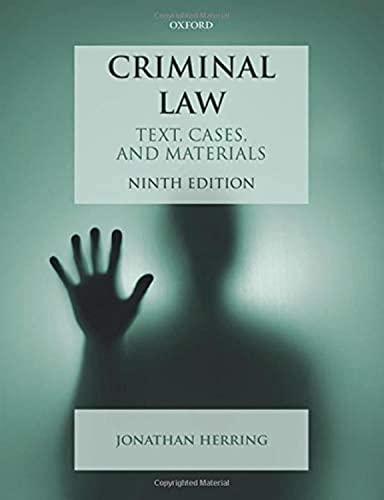Question
You represent Danfield's Auto Repair. On September 2, 20xx, you sent the plaintiff a set of Interrogatories pursuant to FRCP 33. Request 4 asked: 4.
You represent Danfield's Auto Repair. On September 2, 20xx, you sent the plaintiff a set of Interrogatories pursuant to FRCP 33. Request 4 asked: 4. Have you used any forms of social or electronic media to post information or communicate with others in the past year, including posts or communications about the accident, or your claims in this lawsuit? If so, how often to you do so, and what social media platforms to you use? The plaintiff responded: Yes, I do use social media including Facebook, Instagram, and LinkedIn on a regular basis. All of my accounts are private and not accessible to the public. I also text and use email. On October 28, 20xx, you sent the plaintiff a set of Requests for Production of Documents pursuant to FRCP 34. Request 3 requested the following information: 3. All messages, posts, pictures, videos, or any other form of communication, on any social media platform used by the Plaintiff including, but not limited to, Facebook, Instagram, and LinkedIn, that were sent, posted, received, or viewed by the Plaintiff: 1. Around the time of the accident on February 5, 20xx; or 2. Any time after the accident, and relate to any of the following: a) The accident at issue in this lawsuit, or any of the events surrounding the accident, in any way. b) Any of the allegations, assertions, claims, or statements in the Plaintiff's complaint. c) Plaintiff's ability to perform daily activities, including information that may show that Plaintiff is able to perform daily activities. d) Plaintiff's physical injuries from the accident, including information that may show his ability to perform physical activities. e) Plaintiff's alleged pain and suffering, including posts that may show other sources or causes of pain and suffering. f) Plaintiff's alleged mental anguish, including posts that may show other sources or causes of mental anguish. g) Plaintiff's loss of enjoyment of his normal life, including information that may show that either Plaintiff is participating in activities or events that demonstrate that he is enjoying his normal life, or provide other sources or causes of loss of enjoyment of life. h) Plaintiff's employment, including efforts to find new employment. The accident occurred on February 5, 20xx. The plaintiff filed his lawsuit in June 5, 20xx. The requests were sent on October 28, 20xx, so the requested information seeks roughly eight months of material, and then plaintiff would have an obligation to update throughout the litigation. Plaintiff objected to the request, stating: Objection. The requests are overbroad, call for irrelevant information, and violate the plaintiff's right to privacy. Since the requested information is privately posted to social media, the defendant must make a threshold showing that the plaintiff has posted information on social media that is relevant to their requests in order to justify the time and expense of plaintiff going through all of that material to look for information responsive to their requests. You and plaintiff's counsel spoke by phone to try to resolve the dispute, but were unable to do so. Plaintiff's counsel indicated that she believed that the Central District used a form of the "threshold showing" requirement in Mailhoit v. Home Depot U.S.A., Inc., 285 F.R.D. 566, 570 (C.D.CA. 2012 She said that other cases in other districts have required a showing that public social media posts, or some other factual information, must show that the private posts will turn up relevant information before the private posts are discoverable. She mentioned the Georgel v. Preece, 2014 WL 12647776 at *1 (E.D. KY. February 28 2014), case as another relevant case in the matter. She said that while the Northern District of California (where the suit was filed) does not appear to have addressed the issue yet, she believes the court will require it, so they are unwilling to provide the requested discovery absent such a showing, which they do not believe is met here. Your task is to file a motion to compel with the Federal Court of the Northern District of California where the complaint was filed, asking the court to compel the production of the requested information. You should do some research on the threshold showing requirement, and address that in your motion along with the other objections of relevance and privacy. You should start your research by reviewing the Malhoit and Georgel cases and looking for ways to either establish that the requirements of those cases are met here, or distinguish them. You should also look to see if there are other cases that have rejected the threshold showing requirement, or that help your argument for production of the information. If there are any, you should use them in the analysis as well.
Step by Step Solution
There are 3 Steps involved in it
Step: 1

Get Instant Access to Expert-Tailored Solutions
See step-by-step solutions with expert insights and AI powered tools for academic success
Step: 2

Step: 3

Ace Your Homework with AI
Get the answers you need in no time with our AI-driven, step-by-step assistance
Get Started


